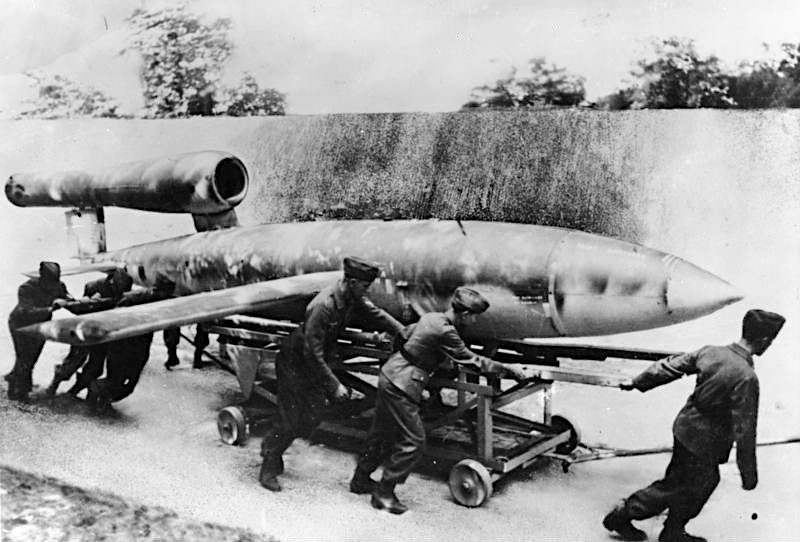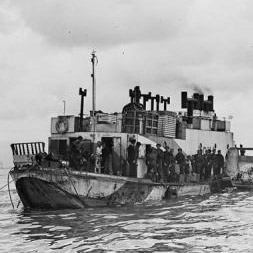I Was There! - When those Victory Salvos Roar in Moscow
The War Illustrated, Volume 8, No. 188, Page 250, September 1, 1944.
Since the guns of Moscow fired their first thunderous salvos in August 1943 in celebration of the liberation of Orel, there have been many scores of these salutes to enliven and encourage the Muscovites and the Allies in general. Paul Winterton, News Chronicle special correspondent, sent the following descriptive report from Moscow on July 31st, 1944.
The salute now follows a well-defined ritual. About fifteen minutes before it is due to take place the Moscow loudspeaker network announces: "In a few minutes there will be an important communication. Listen to our broadcast." This is repeated several times. Then at the appointed time a male announcer reads in ringing tones the Order of the High Command naming the town taken. About ten minutes later the guns start.
The salute itself has not changed in style the only change was after the Kharkov salute, when it was found that, while tracer bullets helped to give a spectacular pyrotechnical display, they tended to fall on the the heads of the people afterwards. So now we have just guns and rockets. First you see the red flash of the guns in the sky, then hear the roll of explosions, and, last of all, the crack of hundreds of red, green and white rockets soaring skywards from dozens of rooftops. All over Moscow when the rockets are at the top of their flight the streets become as light as day.
After a time you can learn to judge the importance of the event being celebrated without hearing the announcement. For small places there is a salute of 12 salvos from 124 guns. For big towns 224 guns fire 20 salvos. The expert will cock his ear to the window and say: "Hum, that’s not big enough for Lvov. It must be Przemysl."
The salutes which bring everyone into the streets or to the windows are those which celebrate the liberation of the capital of a Republic, like Kiev, Minsk and Vilna. They get 24 salvos from 324 guns and on those occasions windows rattle and buildings seem to shake.
Nowadays it gets around beforehand that a big salute is expected. Little boys, who see everything, notice exceptionally large numbers of guns being brought in from the outskirts to take up their positions on appointed sites along the Moscow River. And the news goes around. A.A. battery crews which fire the salutes are men, but on the roofs, Red Army girls fire off the rockets. It is a responsible job, for they have to get them all into the air together, but it is a job they like. Incidentally, it is reliably reported that the rockets are part of the vast booty captured from the Germans. I hope it is true.
Street crowds which watch the salutes are just as large and just as eager as they were when the first salvos were fired. Round caps are still thrown into the air as the rockets go up and there is eager discussion of the latest victory. There was never a time when the movements of the Red Army were more closely followed than now, and that is natural enough because there was never a time when their activities were so exciting.
I was in a theatre the other night when a salute was announced on the radio. In the interval between acts the director of the theatre came on the stage and told us Bialystok had fallen. There was loud clapping and then all stood for the national anthem. In the middle of the anthem the director called for three cheers for the Red Army and Stalin. There is no doubt that spirits are very high. Forty-one salutes in just over a month-forty-one towns recaptured-would make anyone cheerful.
These summer nights, of course, the rockets lose some of their effect. Fireworks ought to be a winter sport. Generally speaking an effort is made to keep the salute until it is beginning to get dark-but when you have a day like last Thursday (27th July), with five salutes to work off in an evening, you have to make an early start. What with the national anthem played five times and 100 salvos from 224 guns and then cheerful music from the loudspeakers going on until one in the morning, I think that was about the noisiest night I have ever known in Moscow. Well, nobody minds noise in a good cause!
Previous and next article from I Was There!
I Was There! - I Visited a Bombed-Out Flying-Bomb Site
Pointed at Bristol, bombed by Allied Air Forces into abandonment, a flying bomb installation at Martinvast, Normandy, has been inspected by war correspondent Peter Duffield. His story, and interview w
I Was There! - They Bake 1,000 Loaves a Day for Invasion Craft
Admiral Sir Bertram Ramsay, Allied Naval C.-in-C., has sent a message of congratulation to the men in the landing ships engaged in the vitally important work of building up supplies in Normandy. Here
Index
Previous article
I Was There! - I Visited a Bombed-Out Flying-Bomb Site
Pointed at Bristol, bombed by Allied Air Forces into abandonment, a flying bomb installation at Martinvast, Normandy, has been inspected by war correspondent Peter Duffield. His story, and interview w
Next article
I Was There! - They Bake 1,000 Loaves a Day for Invasion Craft
Admiral Sir Bertram Ramsay, Allied Naval C.-in-C., has sent a message of congratulation to the men in the landing ships engaged in the vitally important work of building up supplies in Normandy. Here




